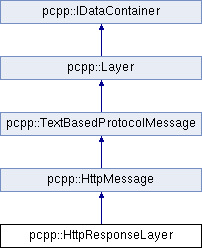| Enumerator |
|---|
| Http100Continue | 100 Continue
|
| Http101SwitchingProtocols | 101 Switching Protocols
|
| Http102Processing | 102 Processing
|
| Http200OK | 200 OK
|
| Http201Created | 201 Created
|
| Http202Accepted | 202 Accepted
|
| Http203NonAuthoritativeInformation | 203 Non-Authoritative Information
|
| Http204NoContent | 204 No Content
|
| Http205ResetContent | 205 Reset Content
|
| Http206PartialContent | 206 Partial Content
|
| Http207MultiStatus | 207 Multi-Status
|
| Http208AlreadyReported | 208 Already Reported
|
| Http226IMUsed | 226 IM Used
|
| Http300MultipleChoices | 300 Multiple Choices
|
| Http301MovedPermanently | 301 Moved Permanently
|
| Http302 | 302 (various messages)
|
| Http303SeeOther | 303 See Other
|
| Http304NotModified | 304 Not Modified
|
| Http305UseProxy | 305 Use Proxy
|
| Http306SwitchProxy | 306 Switch Proxy
|
| Http307TemporaryRedirect | 307 Temporary Redirect
|
| Http308PermanentRedirect | 308 Permanent Redirect,
|
| Http400BadRequest | 400 Bad Request
|
| Http401Unauthorized | 401 Unauthorized
|
| Http402PaymentRequired | 402 Payment Required
|
| Http403Forbidden | 403 Forbidden
|
| Http404NotFound | 404 Not Found
|
| Http405MethodNotAllowed | 405 Method Not Allowed
|
| Http406NotAcceptable | 406 Not Acceptable
|
| Http407ProxyAuthenticationRequired | 407 Proxy Authentication Required
|
| Http408RequestTimeout | 408 Request Timeout
|
| Http409Conflict | 409 Conflict
|
| Http410Gone | 410 Gone
|
| Http411LengthRequired | 411 Length Required
|
| Http412PreconditionFailed | 412 Precondition Failed
|
| Http413RequestEntityTooLarge | 413 RequestEntity Too Large
|
| Http414RequestURITooLong | 414 Request-URI Too Long
|
| Http415UnsupportedMediaType | 415 Unsupported Media Type
|
| Http416RequestedRangeNotSatisfiable | 416 Requested Range Not Satisfiable
|
| Http417ExpectationFailed | 417 Expectation Failed
|
| Http418Imateapot | 418 I'm a teapot
|
| Http419AuthenticationTimeout | 419 Authentication Timeout
|
| Http420 | 420 (various messages)
|
| Http422UnprocessableEntity | 422 Unprocessable Entity
|
| Http423Locked | 423 Locked
|
| Http424FailedDependency | 424 Failed Dependency
|
| Http426UpgradeRequired | 426 Upgrade Required
|
| Http428PreconditionRequired | 428 Precondition Required
|
| Http429TooManyRequests | 429 Too Many Requests
|
| Http431RequestHeaderFieldsTooLarge | 431 Request Header Fields Too Large
|
| Http440LoginTimeout | 440 Login Timeout
|
| Http444NoResponse | 444 No Response
|
| Http449RetryWith | 449 Retry With
|
| Http450BlockedByWindowsParentalControls | 450 Blocked by Windows Parental Controls
|
| Http451 | 451 (various messages)
|
| Http494RequestHeaderTooLarge | 494 Request Header Too Large
|
| Http495CertError | 495 Cert Error
|
| Http496NoCert | 496 No Cert
|
| Http497HTTPtoHTTPS | 497 HTTP to HTTPS
|
| Http498TokenExpiredInvalid | 498 Token expired/invalid
|
| Http499 | 499 (various messages)
|
| Http500InternalServerError | 500 Internal Server Error
|
| Http501NotImplemented | 501 Not Implemented
|
| Http502BadGateway | 502 Bad Gateway
|
| Http503ServiceUnavailable | 503 Service Unavailable
|
| Http504GatewayTimeout | 504 Gateway Timeout
|
| Http505HTTPVersionNotSupported | 505 HTTP Version Not Supported
|
| Http506VariantAlsoNegotiates | 506 Variant Also Negotiates
|
| Http507InsufficientStorage | 507 Insufficient Storage
|
| Http508LoopDetected | 508 Loop Detected
|
| Http509BandwidthLimitExceeded | 509 Bandwidth Limit Exceeded
|
| Http510NotExtended | 510 Not Extended
|
| Http511NetworkAuthenticationRequired | 511 Network Authentication Required
|
| Http520OriginError | 520 Origin Error
|
| Http521WebServerIsDown | 521 Web server is down
|
| Http522ConnectionTimedOut | 522 Connection timed out
|
| Http523ProxyDeclinedRequest | 523 Proxy Declined Request
|
| Http524aTimeoutOccurred | 524 A timeout occurred
|
| Http598NetworkReadTimeoutError | 598 Network read timeout error
|
| Http599NetworkConnectTimeoutError | 599 Network connect timeout error
|
| HttpStatusCodeUnknown | Unknown status code
|

 Public Member Functions inherited from pcpp::Layer
Public Member Functions inherited from pcpp::Layer